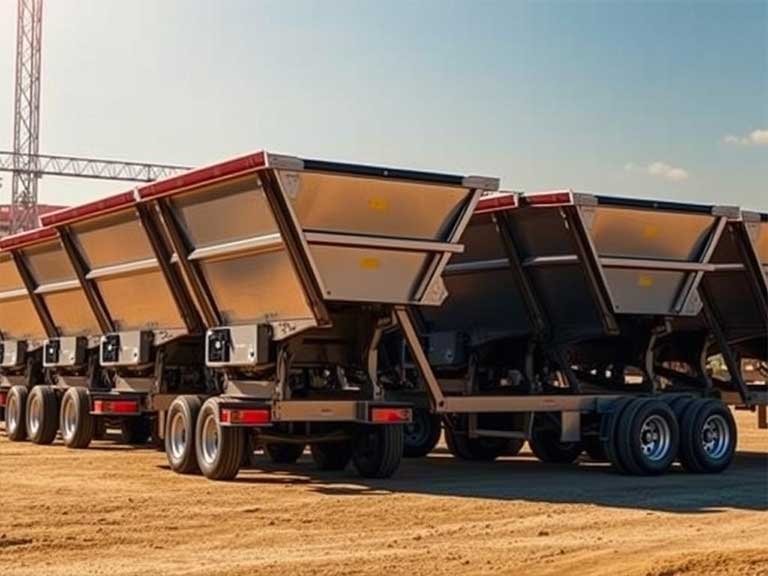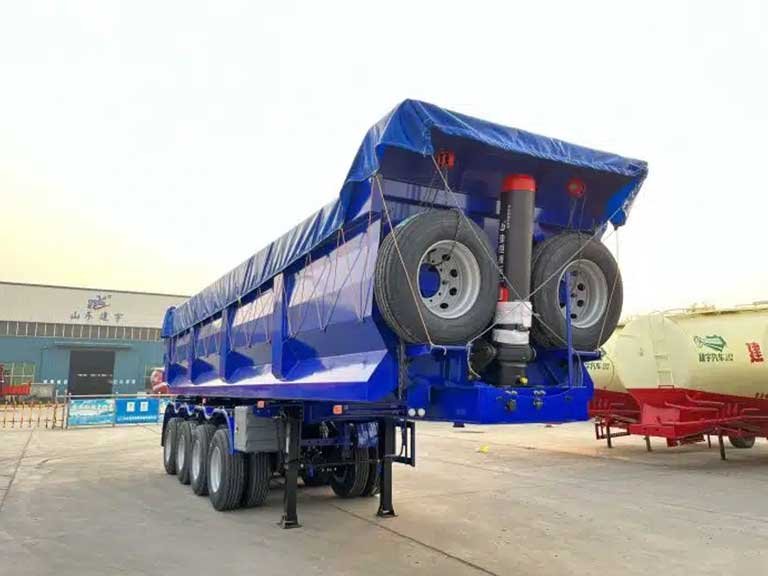Genron International Trade understands the importance of maintaining your end dump trailer to ensure its longevity, safety, and efficiency. Proper maintenance prevents costly repairs and downtime, keeping your operations running smoothly. This comprehensive guide covers regular inspections, lubrication, cleaning, and hydraulic system care.
Table of Contents
Regular Inspections
Regular inspections are crucial for maintaining an end dump trailer. Conduct thorough and systematic checks before each use to identify potential issues early and maintain performance and safety standards.
- Visual Inspection: Perform a comprehensive visual inspection. Look for visible damage, wear, or signs of corrosion, especially on the chassis, joints, and welds, which are crucial for structural integrity.
- Operational Checks: Test all moving parts, including hydraulic lifts, tailgates, and other mechanisms. Ensure they operate smoothly without abnormal noises, which could indicate issues. Understanding proper loading techniques is essential to prevent damage during operations.
- Component Inspection: Check key components such as brakes, axles, and suspension systems for wear or damage. Ensure brake pads and discs are in good condition and suspension systems operate correctly.
- Load Testing: Periodically conduct load tests to ensure the trailer performs well under full load conditions, helping to identify any weaknesses in the structure or hydraulic systems.
Begin with a bespoke semi-trailer designed for your exact needs. Whether it’s heavy-duty hauling or specialized cargo, we’ve got the perfect solution to keep you moving forward.
Lubrication
Lubrication reduces friction and wear on moving parts, preventing expensive repairs, ensuring smooth operation, and extending the trailer’s lifespan.
- Identify Lubrication Points: Common points needing regular lubrication include hinges, joints, hydraulic cylinders, and tailgate mechanisms. Refer to the trailer manual for detailed diagrams.
- Choose the Right Lubricant: Use appropriate lubricants for each component. Heavy-duty grease is typically used for joints and hinges, while hydraulic oil is used for the hydraulic system. Ensure high-quality lubricants for maximum protection.
- Lubrication Schedule: Establish a regular lubrication schedule based on usage. High-use trailers may require weekly lubrication, while lower-use trailers may only need monthly maintenance. Adhere to this schedule for consistent performance.
- Lubrication Technique: Apply lubricants correctly to cover all moving parts without over-lubricating, which can attract dirt and debris.
Cleaning
Regular cleaning prevents material buildup that can lead to corrosion and damage, ensuring your trailer remains in optimal condition.
- External Cleaning: Regularly wash the exterior to remove dirt, mud, and road salts. Use a high-pressure washer for hard-to-reach areas, focusing on the undercarriage prone to debris buildup and rust.
- Internal Cleaning: Clean the trailer bed after transporting corrosive or sticky materials to prevent residue buildup. This maintains the bed’s integrity and prevents corrosion.
- Corrosion Prevention: Apply corrosion-resistant treatments to vulnerable areas, creating a protective layer on the trailer surface to prevent rust and extend its lifespan.
- Cleaning Schedule: Establish a routine cleaning schedule based on the materials transported and operating conditions. Trailers used in harsh conditions may require more frequent cleaning.

Hydraulic System Maintenance
The hydraulic system is essential for the operation of an end dump trailer. Proper maintenance ensures reliable and efficient operation, preventing downtime and costly repairs.
- Fluid Level Check: Regularly check hydraulic fluid levels. Low levels can reduce system efficiency or cause failures. Top up hydraulic oil as needed using the specified type.
- Fluid Quality Check: Check if hydraulic oil is contaminated. Discolored or milky fluids may indicate water or other contaminants. If contaminated, drain and replace the fluid.
- Hose and Connection Inspection: Inspect hydraulic hoses and connections for leaks, cracks, or wear. Replace any damaged hoses immediately.
- Cylinder Inspection: Check hydraulic cylinders for leaks and smooth operation. Repair or replace if necessary.
- Pump and Motor Maintenance: Ensure hydraulic pumps and motors function properly. Listen for unusual noises and check for signs of wear. Regularly service these components.
- Pressure Testing: Conduct regular pressure tests to ensure the hydraulic system operates within recommended pressure ranges.
Tire Maintenance
Tires are crucial for safety and performance. Proper maintenance ensures safety, performance, and improved fuel efficiency.
- Regular Inspection: Regularly check tires for wear, damage, or punctures. Look for uneven wear patterns, which may indicate alignment or suspension issues.
- Pressure Check: Maintain correct tire pressure as per the trailer manual. Under-inflated or over-inflated tires can lead to poor handling and increased wear.
- Tread Depth Monitoring: Monitor tread depth to ensure adequate traction. Replace tires promptly when tread wears down to legal limits.
- Tire Rotation and Alignment: Rotate tires regularly to ensure even wear. Inspect and adjust alignment as needed.
Electrical System Check
The electrical system controls critical functions such as lights and brakes. Regular checks ensure reliable operation.
- Battery Maintenance: Check battery charge status and clean terminals to prevent corrosion. Ensure the battery is securely mounted and in good condition.
- Wiring Inspection: Inspect wiring for wear, corrosion, or damage. Replace any worn or damaged wiring.
- Lighting System: Test all lights including brake lights, turn signals, and markers. Replace any burnt-out bulbs and clean lenses for visibility.
- Brake System: Regularly check the electrical brake system for proper operation. Ensure all connections are secure and brakes function correctly.

Structural Integrity
Maintaining structural integrity is crucial for safety and performance. Ensure the trailer remains safe and reliable under load.
- Chassis and Body Inspection: Regularly inspect the chassis and body for cracks, rust, or other damage. Pay special attention to welds and joints.
- Corrosion Control: Apply corrosion-resistant treatments to vulnerable areas. Clean and repaint damaged areas to prevent further corrosion.
- Load Capacity: Ensure the trailer is not overloaded. Regularly check load distribution to prevent stress on the chassis and suspension system.
- Suspension System: Check the suspension system for wear and damage. Replace worn components to maintain stability and handling.
Conclusion
Maintaining an end dump trailer involves regular inspections, proper lubrication, cleaning, and attention to hydraulic, tire, and electrical systems. At Genron International Trade, we emphasize preventative maintenance to ensure the safety, efficiency, and longevity of our trailers. By following these maintenance guidelines, you can keep your end dump trailer in optimal condition, ensuring reliable performance and minimizing downtime.
FAQ
What are common signs of hydraulic system failure?
Common signs include slow operation, unusual noises, leaks, and erratic cylinder operation. Regular inspection and maintenance can help prevent these issues.
How often should I lubricate the moving parts of my end dump trailer?
Lubrication frequency depends on usage. High-use trailers may need weekly lubrication, while lower-use trailers may only need monthly maintenance. Follow the manufacturer’s recommendations.
What measures should I take to prevent corrosion of my end dump trailer?
Regular cleaning, applying corrosion-resistant treatments, and promptly addressing rust or damage are effective ways to prevent corrosion. Keep the trailer dry and clean after each use.
How do I check and maintain the electrical system of my end dump trailer?
Regularly check battery charge and clean terminals. Inspect wiring for wear or damage, ensuring all lights and brake systems operate correctly.
What are the key steps in tire maintenance for an end dump trailer?
Regularly check for wear or damage, maintain correct tire pressure, monitor tread depth, and rotate tires to ensure even wear.
Why is structural integrity important for an end dump trailer?
Maintaining structural integrity is crucial for safety and performance. Regularly inspect the chassis and body, ensuring load capacity and suspension systems are in good condition.
How do I maintain fluid quality in the hydraulic system?
Regularly check fluid levels and quality. Replace contaminated hydraulic oil promptly. Ensure there are no leaks and cylinders operate smoothly.


